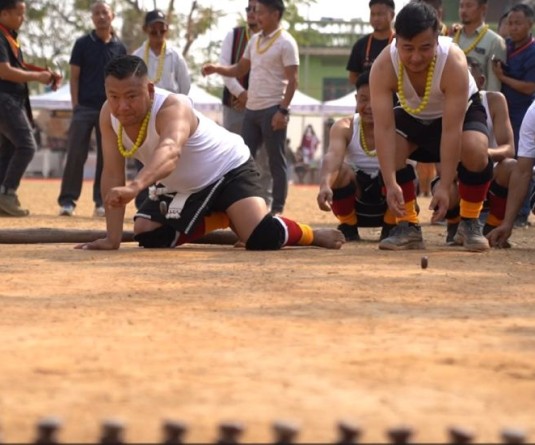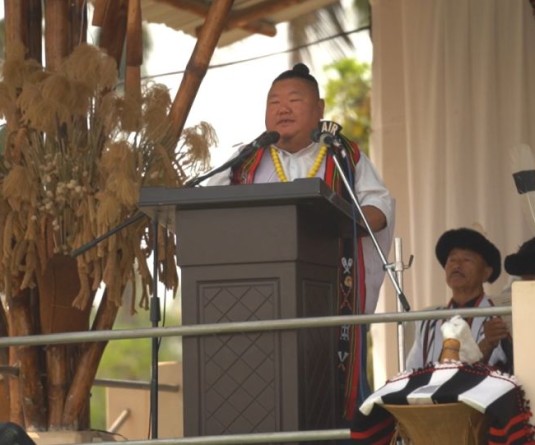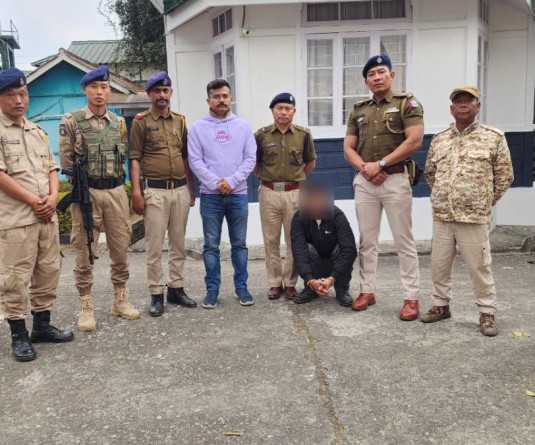World Day against Trafficking in Persons was observed at Prodigals' Home, Dimapur on July 29. (Morung Photo)
World Day against Trafficking in Persons observed in Dimapur
Morung Express News
Dimapur | July 29
Dimapur railway station is now like the gateway for children to run away, where three to four cases are reported in a day, disclosed Lozua Kape, Centre Coordinator, Childline, Dimapur (Rescue and Rehabilitation for Trafficked Women and Children).
“These instances are all trafficking,” Kape highlighted, during the observation of World Day against Trafficking in Persons. The awareness event was organised by Dimapur District Administration and District Hub for Empowerment of Women, Beti Bachao Beti Padhao and Sakhi-One Stop Centre (OSC), Dimapur in collaboration with Childline, Dimapur at Prodigals' Home, Dimapur on July 29.
Delving on the theme, “Reach every woman of trafficking: Leave no one behind,” she observed that many of the victims are children brought to private homes to work as domestic helpers, and their identities are often concealed, depriving them of their basic rights.
She asked the gathering of village councils, civil societies and the NGOs to ponder on what will happen if the child dies, without any knowledge of the family.
Defining human trafficking as “an unlawful act of transporting a person inorder to benefit from their work or services,” she said that most of the Nagas are involved in human trafficking in one way or the other.
Trafficking business is the third highest earning business at present and the traffickers are not stopping anytime soon, but have different tricks up their sleeves every day, Kape informed, while stating that the public are unable to catch up.
She said that the primary target of traffickers are often those who lack legal status, live in poverty, have limited access to education, health care or decent work, face discrimination or abuse. They are the most vulnerable group of people and eventually become victims of trafficking.
To this end, she asked all to join hands to do away with this evil, by starting from one's homes and neighbourhood and the community. She made an appeal to the gathering to voice out against such wrongs when we witness in our homes, without thinking that the police or the OSC, the Women Helpline or the Childline will do their job.
She further appealed not to be judgemental when the victims are saved and brought back home, but instead show support, and help someone when you go back home.
Dr Tiamenla Phom, Additional Deputy Commissioner of Police (ADCP) for Women & Juvenile Dimapur, stressed the urgent need for awareness and prevention of human trafficking, especially as Nagaland shares international borders and has become a hub for such activities.
While the term 'human trafficking' is broad in itself, in simple terms, it means a trade of humans. She highlighted that child and sex trafficking are the two main aspects that are prevalent in the state, especially after the pandemic.
Other than extortion, this is a crime which affects the very core of the society, she said while regretting that “all of us are so unaware of what is going on right now, except for the police and the NGOs.”
Maintaining that the topic is way above any particular tribe, she called upon every individual, village councils, churches and the civil societies to fight human trafficking together.
While delivering short speech, Legal cum Probation Officer (LCPO) Moajungla stated Nagaland has been identified as a major point of origin for human trafficking in India, and the North East region remains vulnerable due to wealth disparity and lack of employment opportunities.
As per the report related to missing cases in Nagaland, she mentioned 83% of missing individuals were below 18 years, with 13% of the missing cases in Nagaland attributed to trafficking. As per the report from 2015 to 2021, 28 victims were rescued and among the 28 recued people, 26 were female.
She highlighted the common challenges in combating trafficking, such as victims' reluctance to report cases due to shame, stigma, fear, trauma, and threats from high-profile perpetrators or mafia involved in trafficking.
She called for widespread awareness among parents and communities and encouraged youths to volunteer and get trained on the issue.
Khumchuba, Panel Lawyer (DDLSA), addressed the legal mechanisms to tackle human trafficking and urged the community to avail the free services provided by Dimapur District Legal Services Authority (DDLSA) for women of SC and ST community with a yearly salary of less than 1 lakh.
He regretted that the Naga people do not avail this free legal service and that he has been in this field for more than seven years, and till date there is no outcome. He therefore urged the gathering to come forward and seek help when they need it, as the door is always open.
Tovikali Shohe, General Secretary of Baptist Youth Fellowship, emphasized the role of civil societies in preventing human trafficking by sharing her experiences of working with an international NGO with victims of sex trafficking. She urged civil societies to be vocal, action-oriented, and maintain strong networks with churches, theological institutions, shopping malls, and businesses to combat the issue effectively.
The event emphasized the collective responsibility of society to fight against human trafficking and called for unity and action in bringing an end to this heinous crime. The programme was chaired by Khiuzan Kaurinta, EAC (Sadar) Dimapur District Administration who also gave the welcome address.``






